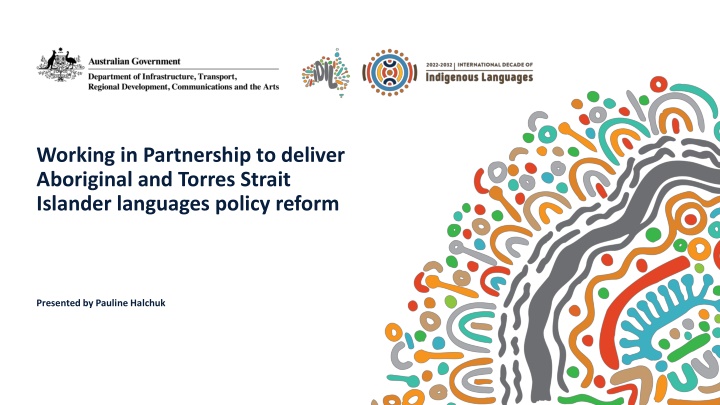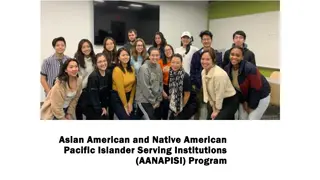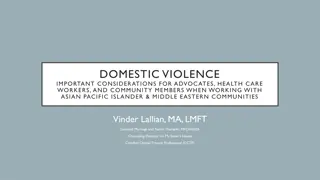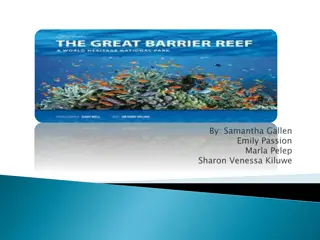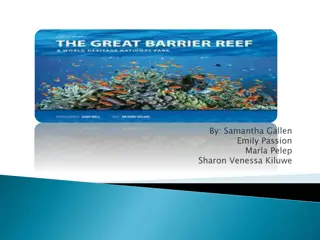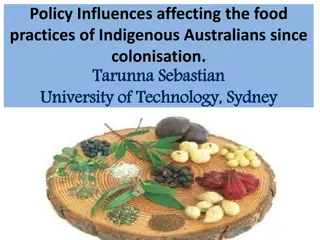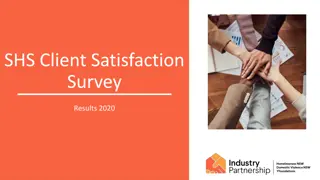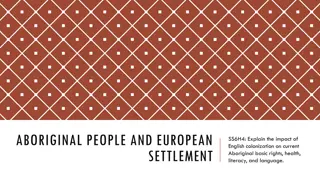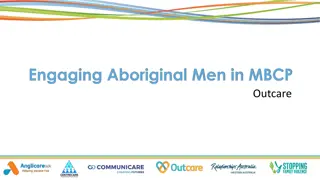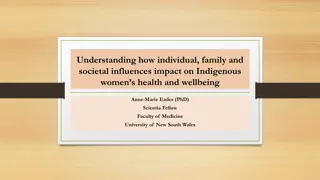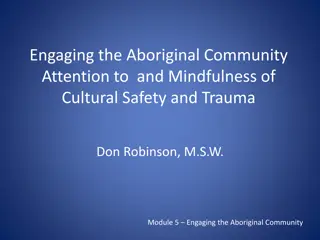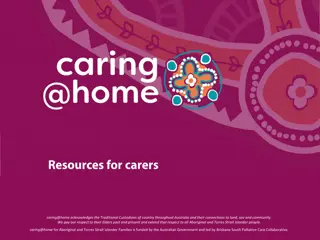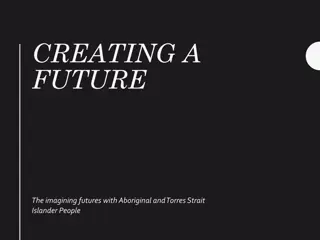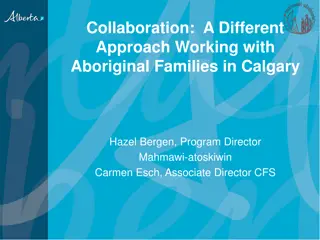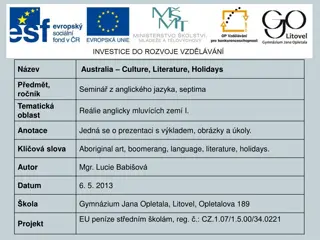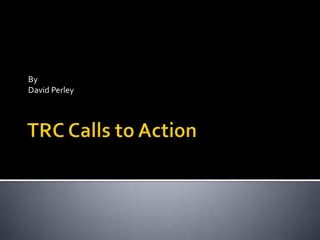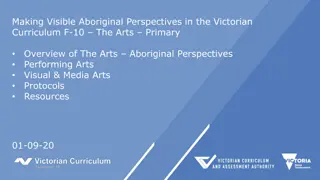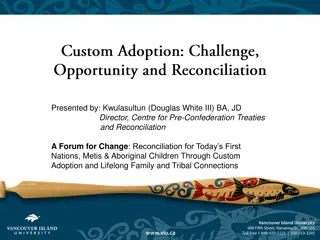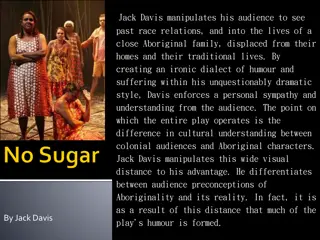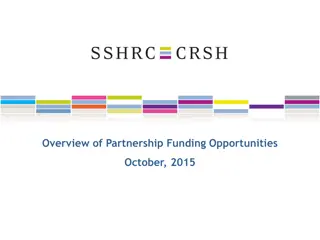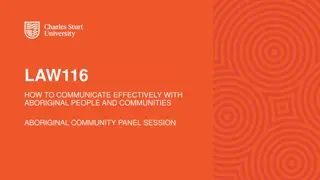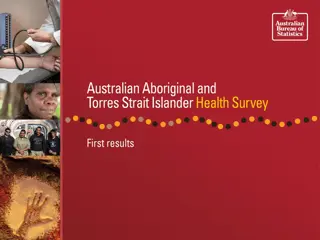Working in Partnership to deliver Aboriginal and Torres Strait Islander languages policy reform
The Office for the Arts is leading policy reform for Aboriginal and Torres Strait Islander languages at the Commonwealth level. The Indigenous Languages Policy Taskforce aims to drive the Government's participation in the International Decade of Indigenous Languages 2022-32 and the National Agreement on Closing the Gap Target 16. Discover the principles of collaboration and partnership, as well as the operationalization of partnership in government decision-making processes.
Uploaded on Feb 20, 2025 | 1 Views
Download Presentation

Please find below an Image/Link to download the presentation.
The content on the website is provided AS IS for your information and personal use only. It may not be sold, licensed, or shared on other websites without obtaining consent from the author.If you encounter any issues during the download, it is possible that the publisher has removed the file from their server.
You are allowed to download the files provided on this website for personal or commercial use, subject to the condition that they are used lawfully. All files are the property of their respective owners.
The content on the website is provided AS IS for your information and personal use only. It may not be sold, licensed, or shared on other websites without obtaining consent from the author.
E N D
Presentation Transcript
Working in Partnership to deliver Aboriginal and Torres Strait Islander languages policy reform Presented by Pauline Halchuk
Introduction The Office for the Arts has policy responsibility for Aboriginal and Torres Strait Islander languages at the Commonwealth level. To lead this work, the Indigenous Languages Policy Taskforce in the Office for the Arts (OFTA) was established in November 2021 to: Lead the Government s participation in the International Decade of Indigenous Languages 2022-32 (International Decade). Lead the Government s delivery under the National Agreement on Closing the Gap (Closing the Gap): Target 16 and Aboriginal and Torres Strait Islander Languages Policy Partnership (Clause 38 of Closing the Gap). 2
Workshopping Partnership As part of team planning, the Taskforce considered what it means to work in partnership and what this means in practice. We established some high level principles on what it means to work in partnership Collaboration and partnership means: recognising expertise and value add; joint accountability for outcomes; ensuring transparency and accessibility of information; and creating a safe space for an open, honest dialogue. Our partners are experts on language policy, we are experts in government processes and ensuring Indigenous voices are centralised in the advice provided to Government decision makers 20 February 2025 3
Operationalizing Partnership The Department is committed to embed a best-practice approach to working in partnership with Aboriginal and Torres Strait Islander peoples across all of our work in line with the Priority Reform One under Closing the Gap and the principle of Nothing About Us, Without Us. We needed to consider how we can share decision-making, or effectively operationalize this idea, given our processes or the beige tape of internal government decision making. How do we share decision making given our procurement, Cabinet and other rules? The reality is the decision for expenditure of public money lies with the responsible minister or accountable authority. 20 February 2025 4
Operationalizing Partnership cont We tested all of our processes by asking: what do we do and how can we do it in partnership? We returned to source documentation to see if it actually prevents us from taking a partnership approach. We started by seeking advice from our internal areas, ie procurement and grants teams. In actuality, there is nothing that prevents us from bringing in external parties into our internal decision processes. Once we had internal support, we began making phone calls and setting up meetings with our external partners to test our thinking and seek their support. 20 February 2025 5
Example: Sharing decision making on recommendations Closing the Gap (CtG) partnership funding The Department received $4.3 million of funding for pilot projects to establish place- based partnerships between Indigenous Language Centres and local service delivery partners in health and early childhood. While the funding decision was already made, we wanted to work with our partners in deciding on the allocation of the funding. We reached out to our Coalition of Peaks members to see if they would interested in working with us and ended up establishing an assessment panel with representatives from: OFTA, First Languages Australia; SNAICC; NACCHO; the Departments of Health and Education. This team established the selection criteria, assessed the applications, and formed the advice that is currently with government for decision. 20 February 2025 6
Example: Partnering for delivering the International Decade of Indigenous Languages The commitment to imbed Priority Reform 1 is best illustrated through the establishment of the International Decade Directions Group. The Directions Group was established through a national Expression of Interest process The EOI was provided to an Indigenous editing service to ensure clear community focused language. Applicants we able to submit phone and video EOIs The selection panel included the Coalition of Peaks Secretariat, First Languages Australia, OFTA and AIATSIS. Received 58 applications and selected 11 members plus FLA as Chair. The membership also includes OFTA, DFAT, NIAA and AIATSIS as ex-officio members (with no voting rights). The Directions Group works in partnership with the Government to outline the priorities for the International Decade and will co-draft the National Action Plan. The relationship is governed by a Terms of References, which is available online. 20 February 2025 7
Whats next? The Aboriginal and Torres Strait Islander Languages Policy Partnership Under Closing the Gap, there is a commitment to establish five Policy Partnerships, including Aboriginal and Torres Strait Islander languages. The Languages Policy Partnership will include 10 Aboriginal and Torres Strait Islander members and 9 government members. The policy partnerships will identify opportunities to work more effectively across governments and make recommendations to the Joint Council about ensuring Aboriginal and Torres Strait Islander cultures and languages are strong, supported and flourishing. A critical element to the partnerships is ensuring adequate resourcing to support Indigenous parties to be equal partners with governments in formal partnerships. 20 February 2025 9
How is your voice brought into policy development? We are working off the principle of partnership, especially valuing expertise. To start, we are listening to all the things that you, the language experts, are saying. You are telling us that: Language is more than a spoken word. It is the essence of identity, wellbeing and knowledge. Immediate action is required to reverse this loss to allow languages and your voice to once again thrive and survive That language needs to be protected through legal channels. Country and language are intimately intertwined. That it has to be more than dictionaries and preservation, that usage in the family environment will ensure that language survives. Community needs to be at the center. 20 February 2025 10
While political will has never been greater, unfortunately we are contending with some fiscal challenges - ie money is tight and it s a competitive space. We have heard the message that more money is desperately needed and we will explore every opportunity to get more money for languages There is a lot of work still underway to work towards some of the structural change that Craig noted as one of the key elements of supporting languages and culture We continue to find ways opportunities to support languages activities. Right now we are: working to change the narrative in government about language, about how we ended up here and about your voice; seeking opportunities to lend support to proposals that achieve these objectives and we will come to you, through the Coalition of Peaks and the Languages Policy Partnership, to seek your views on these proposals. actively exploring options to protect language through legal channels. convening meetings with all government departments to pass on your messages, see if there are opportunities to leverage current work, and test their ambition to do more. This includes influencing how languages is considered through their current funding programs 20 February 2025 11
Conclusion There is strong political and government will to change the direction that things have been going. The truth is that Australia has one of the highest rates of language loss in the world. The impact of colonial policies deliberately broke the connection to language and, therefore, cultural and spiritual identity. Many of these policies endure, and the impact is still felt today. Please continue to share your voice as the language experts. We will work to support you. 20 February 2025 12
